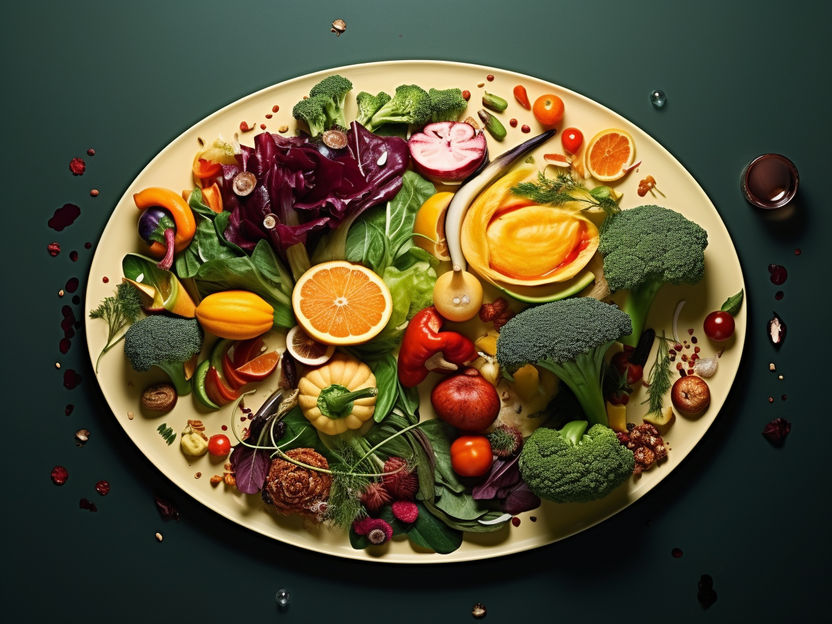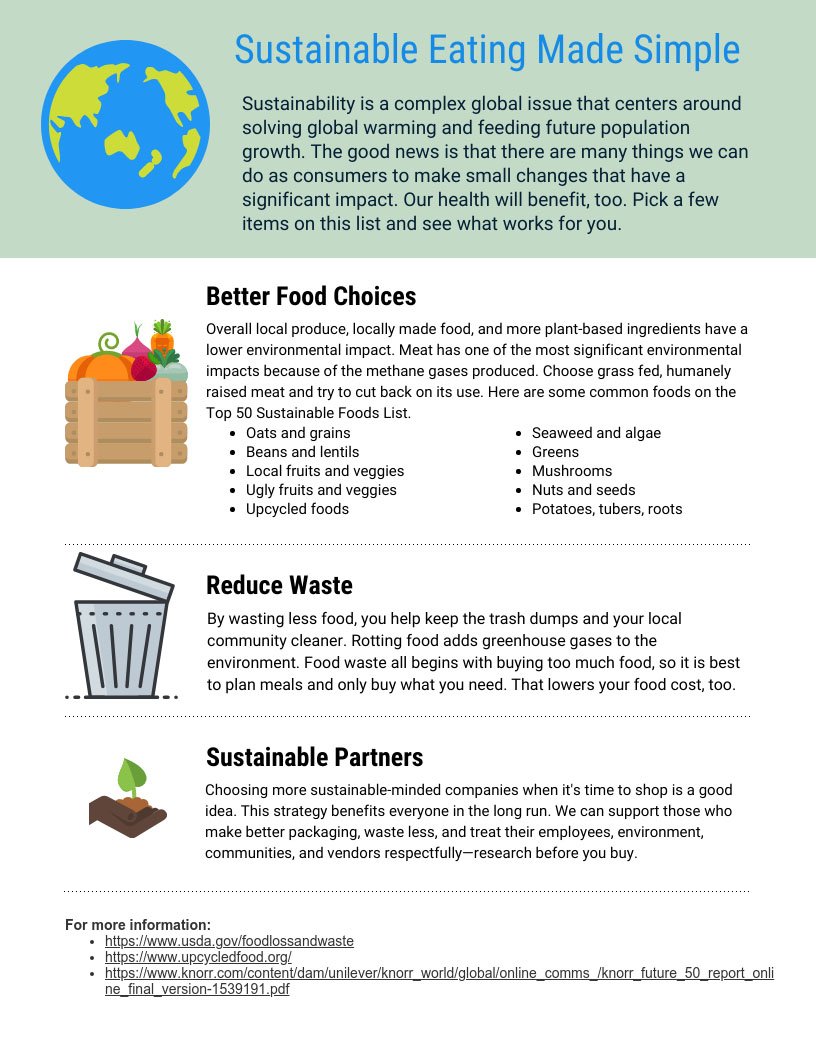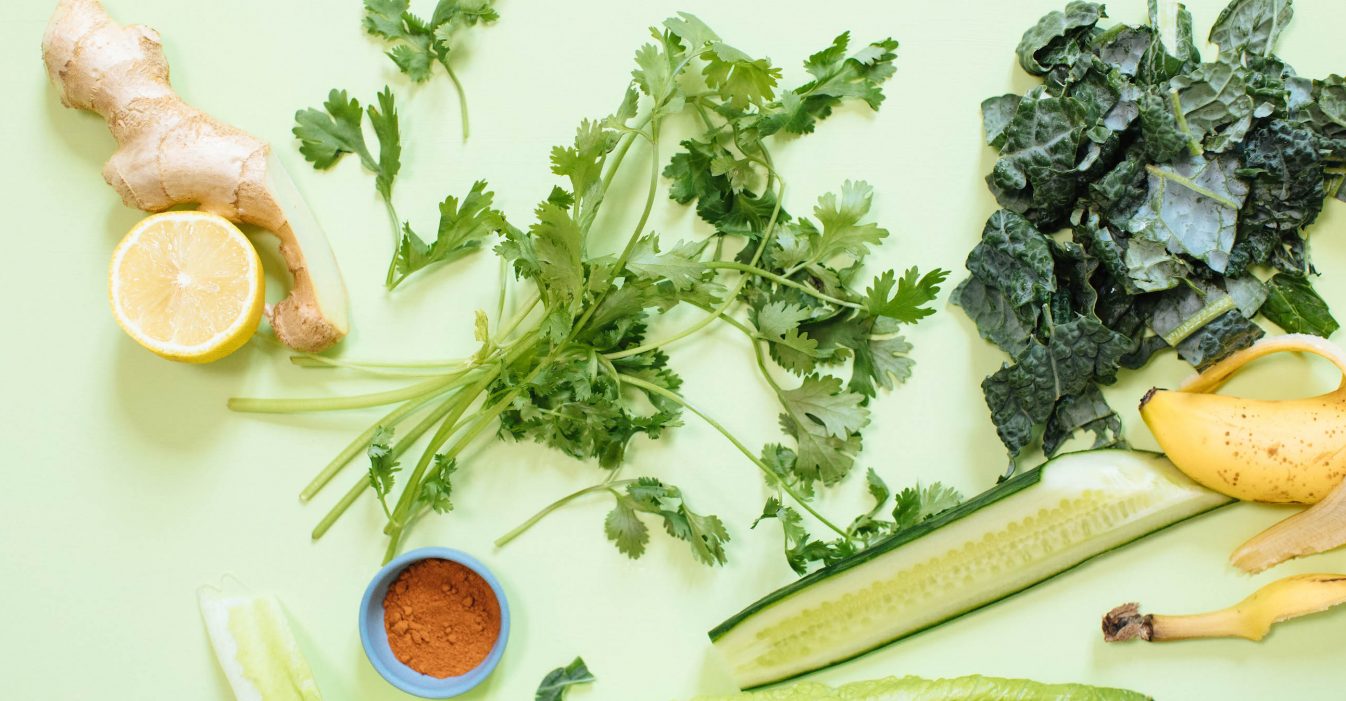Imagine making a simple change in your daily life that not only benefits your health but also positively impacts the environment. That’s what sustainable food choices offer you.
By selecting foods that are kinder to the planet, you contribute to a healthier future for yourself and generations to come. But with so many options available, how do you decide which choices are truly sustainable? This article will guide you through the top sustainable food choices for Americans, helping you make informed decisions that align with your values.
As you discover these options, you’ll find that eating sustainably is easier and more rewarding than you might think. Dive in to learn how you can make a difference with every bite.

Credit: www.yumda.com
Plant-based Proteins
Exploring plant-based proteins offers Americans a sustainable choice. Lentils, chickpeas, and quinoa provide nutritious alternatives to meat. These options are eco-friendly and support a healthier planet.
Eating more plant-based proteins is a significant step toward sustainable eating. These proteins offer a delicious way to reduce your carbon footprint. Plus, they provide numerous health benefits that can improve your lifestyle.
Legumes And Beans
Legumes and beans are powerhouse foods packed with protein and fiber. They are versatile, making them perfect for soups, salads, and even burgers. Next time you’re in the grocery store, consider adding lentils, chickpeas, or black beans to your cart.
Cooking with legumes is straightforward. You can prepare a hearty lentil soup in under an hour. Or, try whipping up a quick chickpea salad for a refreshing lunch.
Have you noticed the vibrant colors of different beans? These colors often mean different nutrients, so mix them up in your meals for a nutrient-rich dish.
Tofu And Tempeh
Tofu and tempeh are excellent choices for those looking to replace meat. Tofu is incredibly versatile and can take on the flavors of whatever dish you’re preparing. Tempeh, with its nutty taste, adds texture and richness to meals.
Ever tried a tofu stir-fry? It’s quick, easy, and a great way to incorporate a variety of vegetables. Marinating tofu or tempeh can enhance its flavor, making it a delightful addition to your favorite dishes.
Tempeh, made from fermented soybeans, is also a good source of probiotics. This means it can benefit your digestive health, a win-win for taste and wellness.
Nuts And Seeds
Nuts and seeds are small but mighty in protein content. They are perfect for snacking or as toppings for salads and yogurt. Consider almonds, chia seeds, or pumpkin seeds as your next snack choice.
Sprinkle chia seeds on your morning oatmeal for an energy boost. Or, carry a small bag of mixed nuts for a quick protein hit during the day.
Have you ever made your own nut butter? It’s easier than you think and allows you to control the ingredients, ensuring a healthy, delicious spread.
Choosing plant-based proteins is not only beneficial for the planet but also for your health. What new plant-based protein will you try this week?

Credit: www.foodandhealth.com
Local And Seasonal Produce
Choosing local and seasonal produce helps Americans make sustainable food choices. It reduces carbon footprints and supports local farmers. Fresh, in-season fruits and vegetables offer better taste and nutrition.
Choosing local and seasonal produce is a fantastic step towards a more sustainable diet. This choice not only supports local farmers but also enriches your meals with fresher, tastier ingredients. Plus, it’s an easy way to reduce your carbon footprint and enjoy the bounty of what each season has to offer.
###
Benefits Of Eating Local
Eating local means your food travels fewer miles to reach your plate. This reduces transportation emissions and helps the environment. It also supports your community’s economy by keeping money within local businesses.
Local produce is often fresher and more nutritious. Since it’s harvested at peak ripeness, you get the best flavors and nutrients. Have you ever noticed how a tomato from a local farm bursts with flavor compared to a store-bought one?
Additionally, buying local food allows you to connect with the people who grow your food. This connection can foster a greater appreciation and understanding of what goes into food production. You might even find yourself more inspired to cook at home and try new recipes.
Seasonal Fruits And Vegetables
Eating seasonally means enjoying fruits and vegetables at their natural peak. This approach often results in better taste and lower prices. Imagine biting into a crisp apple in the fall or juicy strawberries in the spring.
Seasonal produce is more likely to be grown without artificial heating or lighting, reducing the environmental impact. This makes it a greener choice for your diet. Additionally, seasonal eating encourages variety in your meals, as you shift your menu to match what’s available.
Consider making a list of your favorite seasonal fruits and vegetables. Use this list to guide your grocery shopping and meal planning. You’ll likely discover new favorites while supporting sustainable food practices.
By focusing on local and seasonal produce, you contribute to a healthier planet while enjoying tastier meals. What’s your favorite local or seasonal food find? Share your experiences and inspire others to make sustainable choices.
Organic Farming Practices
Organic farming supports sustainable food choices. It uses natural methods to grow crops without harmful chemicals. Americans can enjoy healthier meals while protecting the environment.
Organic farming practices are gaining popularity among Americans who are eager to make sustainable food choices. These practices focus on growing food in harmony with nature, emphasizing the health of soil, plants, and people. Organic farming rejects synthetic chemicals and aims to enhance biodiversity, making it a powerful choice for those who care about the planet. As you consider your food options, understanding the core elements of organic farming can guide you towards healthier and more sustainable choices.
Pesticide-free Crops
Organic farming prioritizes crops grown without synthetic pesticides. This means fewer chemicals end up on your plate and in the environment.
Consider the benefits of eating produce that hasn’t been exposed to harsh chemicals. Not only is it better for your health, but it’s also kinder to the ecosystem.
Have you ever tasted a tomato fresh off an organic farm? The flavor is often richer and more vibrant, free from the chemical residues that can alter taste.
Soil Health And Biodiversity
Healthy soil is the foundation of organic farming. Farmers use natural methods like composting and crop rotation to maintain and improve soil quality.
This approach encourages biodiversity, supporting a range of plant and animal life that naturally keeps pests under control.
Imagine walking through fields where bees buzz freely and birds sing overhead. Such biodiversity is not just beautiful, it’s crucial for a resilient agricultural system.
Organic farming practices offer a blueprint for sustainability. By choosing organic, you support practices that improve soil health and foster biodiversity.
What’s stopping you from trying pesticide-free crops? You could start with a simple salad using organic greens and see if you notice a difference in taste and freshness.
Sustainable Seafood
Sustainable seafood plays a key role in eco-friendly eating. Choosing the right seafood helps protect our oceans and marine life. It also supports local fisheries and communities. Americans can make a difference by selecting sustainable options.
Wild-caught Vs. Farmed Fish
Both wild-caught and farmed fish have their benefits. Wild-caught fish live in their natural habitat. They often have a diverse diet, which can enhance their flavor. But overfishing can deplete fish populations.
Farmed fish, on the other hand, are raised in controlled environments. This method can reduce pressure on wild fish stocks. But it may require resources like feed and space. It’s essential to choose fish that are farmed sustainably.
Certification Labels To Look For
Certification labels guide consumers toward sustainable seafood. The Marine Stewardship Council (MSC) label is well-known. It ensures fish are caught with minimal environmental impact.
The Aquaculture Stewardship Council (ASC) label is for farmed fish. It certifies farms that follow strict environmental standards. The Best Aquaculture Practices (BAP) label is another good choice. It covers the entire production chain from farm to table.
Looking for these labels helps you make informed choices. It ensures the seafood on your plate is sustainable and responsibly sourced.
Reducing Food Waste
Choosing sustainable foods can help reduce waste. Opt for local fruits and vegetables to cut down on transportation emissions. Plant-based proteins like beans and lentils require less resources, making them eco-friendly choices.
Reducing food waste is a powerful way to embrace sustainability in your daily life. It’s not just about saving money; it’s about respecting the resources that go into producing our food. By making conscious choices, you can help reduce the environmental impact of food waste and contribute to a more sustainable future.
Smart Shopping Tips
Think about your weekly meal plan before heading to the grocery store. This helps you buy only what you need and reduces the risk of food spoiling in your fridge.
Use a shopping list to stay focused. It’s a simple tool, yet incredibly effective in avoiding impulse buys that often end up wasted.
Consider buying in bulk for non-perishable items. It reduces packaging waste and can often save you money.
Creative Leftovers
Leftovers can be a goldmine for creativity. Transform last night’s dinner into something new and exciting. For instance, yesterday’s roast chicken can become today’s delicious chicken salad.
Label leftovers with dates. This helps you remember what needs to be eaten first, so nothing goes to waste.
Experiment with “leftover nights”. Once a week, gather all your leftovers and have a buffet-style meal. It’s a fun way to clear out the fridge while encouraging everyone to try something different.
By adopting these practices, you’re not just reducing waste; you’re also honing your skills in the kitchen. What other ways can you think of to reduce food waste in your home?

Credit: nutritionstripped.com
Supporting Ethical Brands
Exploring sustainable food choices supports ethical brands and promotes a healthier planet. Many Americans choose organic vegetables and grass-fed meats. These options help reduce carbon footprints and promote animal welfare.
In today’s world, where climate change and ethical consumption are increasingly significant, supporting ethical brands in your food choices can make a real difference. By choosing products from companies that prioritize sustainability and ethical practices, you not only help the planet but also encourage more businesses to follow suit. Let’s dive into some practical ways you can support ethical brands through your everyday food choices.
Fair Trade Products
Fair Trade products guarantee fair wages and safe working conditions for farmers and workers, primarily in developing countries. By choosing Fair Trade-certified foods like coffee, chocolate, and bananas, you support communities striving for better livelihoods. Next time you’re shopping, look for the Fair Trade label on products. It’s an easy way to ensure your purchase has a positive impact.
Choosing Fair Trade coffee over a regular brand can mean the difference between supporting ethical labor practices and not. Does your favorite morning brew carry that certification? If not, perhaps it’s time to explore new brands that align with your values.
Companies With Green Initiatives
Many companies are stepping up with green initiatives to reduce their environmental impact. These initiatives might include using renewable energy, reducing packaging waste, or supporting sustainable farming. When you choose to buy from these companies, you’re endorsing their efforts to care for the planet.
Consider a brand like Unilever, which has committed to sustainable packaging and sourcing. Their products often come with transparent labels about their sustainability efforts. Do you know which of your go-to brands are genuinely making a difference?
Supporting companies with green initiatives isn’t just about the food you eat. It’s about advocating for a healthier planet. Your choices can inspire more companies to take similar actions. Which brands will you support on your next grocery trip?
By consciously choosing ethical brands, you can help drive positive change in the food industry. What small changes can you make today that will have a big impact tomorrow?
Benefits Of Eating Green
Eating greens helps both health and the planet. Fresh vegetables like spinach and kale support wellness. Local farms provide these options, reducing carbon footprints. Sustainable choices benefit everyone.
Eating green isn’t just a trend; it’s a lifestyle choice that offers numerous advantages for both your health and the planet. By choosing sustainable food options, you contribute to a healthier body and a healthier Earth. Whether it’s swapping out beef for lentils or choosing organic produce, every small step counts.
Health Advantages
Eating more plant-based foods can have a significant impact on your well-being. A diet rich in fruits, vegetables, and whole grains can help lower the risk of chronic diseases. You might find that with each colorful meal, your energy levels soar and your mood improves.
Personal experience has shown me that after incorporating more green choices, I felt less fatigued and more focused. Have you noticed how a fresh salad makes you feel compared to a heavy meal?
Environmental Impact
Choosing sustainable foods also means being kinder to our planet. Sustainable farming practices often use less water and emit fewer greenhouse gases. This means that by choosing these foods, you’re actively reducing your carbon footprint.
Consider the impact of reducing meat consumption; it saves water and reduces deforestation. Imagine the difference if everyone chose just one plant-based meal a week. Wouldn’t it be empowering to know your food choices are making a tangible difference?
By making conscious decisions at the grocery store, you contribute to a better world. Isn’t it time we all started making those choices? Your small steps can inspire others and create a ripple effect.
Frequently Asked Questions
What Is The Most Sustainable Food Choice?
The most sustainable food choice is plant-based foods. They require less land, water, and energy to produce. Eating locally sourced and seasonal produce also minimizes environmental impact. Reducing meat and dairy consumption can significantly lower your carbon footprint and promote sustainability.
What Are The Most Sustainable Foods To Eat?
Eat locally sourced vegetables, legumes, and whole grains for sustainability. Choose seasonal produce and plant-based proteins. Opt for organic and minimally processed foods. Reduce meat and dairy consumption to lower your carbon footprint.
Which Of The Following Foods Is The Most Sustainable?
Plant-based foods are the most sustainable. They require fewer resources and produce lower greenhouse gas emissions compared to meat and dairy. Eating locally sourced fruits, vegetables, and grains further enhances sustainability. Opting for seasonal produce also supports eco-friendly farming practices.
What Is The Best Sustainable Food Source?
The best sustainable food source is plant-based foods like legumes, nuts, seeds, fruits, and vegetables. They require fewer resources and emit lower greenhouse gases compared to animal-based foods. Incorporating these into your diet supports environmental health and personal well-being.
Conclusion
Choosing sustainable food makes a big impact. It helps the planet and supports local farmers. Plus, it can be healthier for you. Small changes matter. Start with easy swaps like organic veggies or local meats. Explore farmer markets for fresh options.
Every choice counts. Eating sustainably isn’t just good for the earth; it’s good for you too. So, let’s all take steps towards a greener plate. Together, we can make a difference. Sustainable choices mean a better future for everyone. Start today.
Make your meals meaningful. Enjoy your journey to healthier, sustainable eating!
